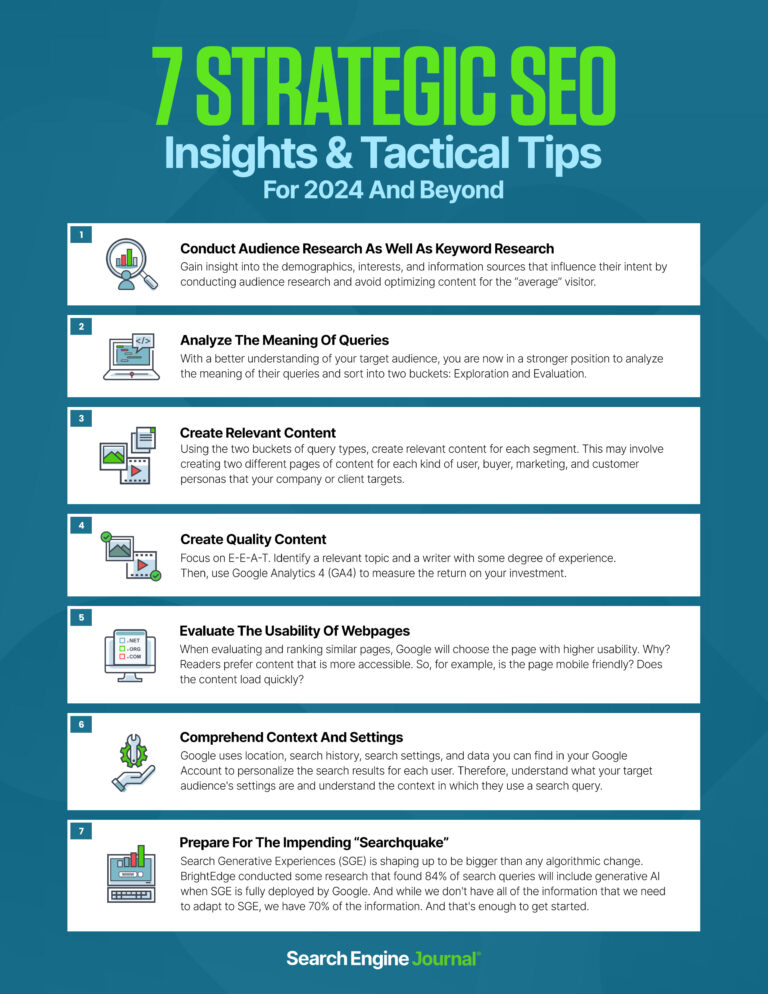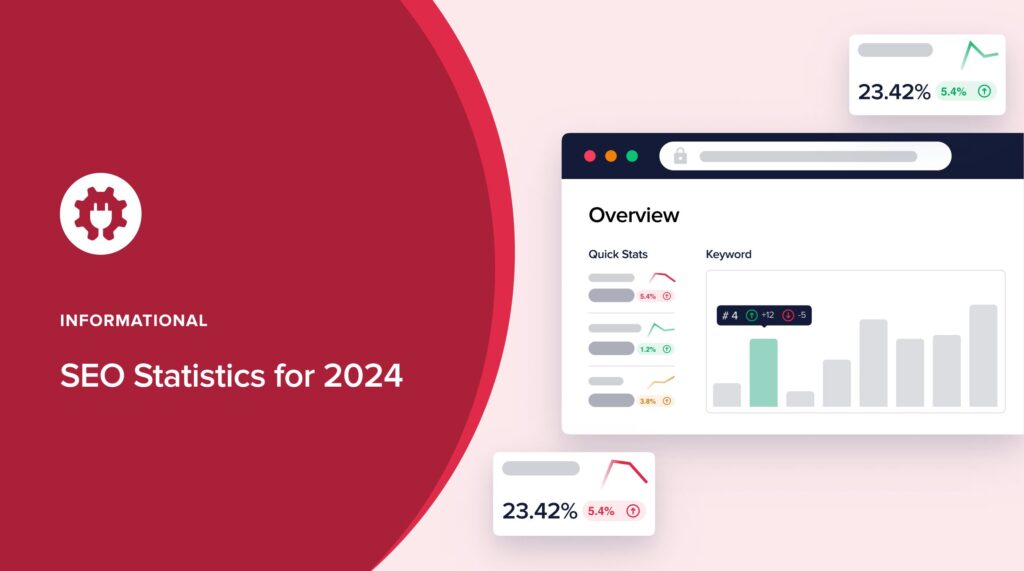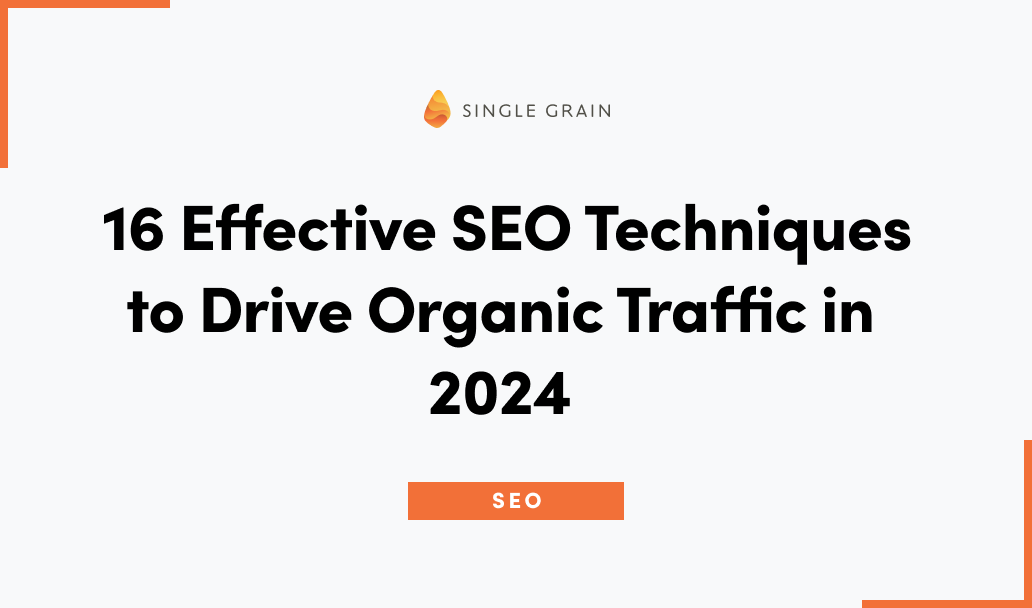Discover the latest SEO secrets for 2024! Find out what strategies are dominating search engines and driving traffic for success.

Image courtesy of via DALL-E 3
Table of Contents
Introduction to SEO
SEO, or search engine optimization, is like the magic ingredient that helps websites appear at the top of search engine results. In simple terms, SEO is all about making sure your website is friendly and easily understood by search engines like Google, Bing, or Yahoo. By using the right SEO practices, websites can attract more visitors and reach a wider audience. Today, we’ll explore why SEO is crucial, especially in 2024.
What is SEO?
Imagine you have a favorite book, but you can’t find it in the library because it’s hidden behind hundreds of other books. SEO helps your website stand out in the massive library of the internet so that people can easily find it. It’s like a map that guides search engines to your website when someone looks for something related to what you offer.
Why is SEO important?
Let’s say you have a lemonade stand, but your stand is hidden in a dark alley where no one can see it. With the right SEO, it’s like moving your stand to a busy street where everyone passing by can see it. SEO helps your website get more visibility, attracting people who are looking for what you have to offer. Without good SEO, your website might get lost in the endless online world.
Understanding Keywords
In the world of SEO, keywords play a crucial role in helping search engines understand what your content is about. Think of keywords as the main ideas or topics that people type into search engines like Google when looking for information. For example, if you are searching for the best pizza in town, you might type in keywords like “best pizza near me” or “top-rated pizza restaurants.” These keywords help search engines match your query with relevant websites.
How to Find the Right Keywords
Choosing the right keywords is essential for your SEO success. To find the most relevant keywords for your website, you can use tools like Google Keyword Planner or SEMrush. These tools allow you to see how often certain keywords are searched for and how competitive they are. By doing keyword research, you can identify the terms that your target audience is using and optimize your content accordingly.
Long-tail Keywords
Long-tail keywords are specific phrases that are more detailed and targeted than generic keywords. For example, instead of using a broad keyword like “pizza,” you might use a long-tail keyword like “best pepperoni pizza in New York City.” Long-tail keywords are valuable because they attract highly targeted traffic to your website. While they may have lower search volumes, they often have higher conversion rates because they match the user’s intent more closely.
Creating Quality Content
In the world of SEO, creating quality content is crucial for improving your website’s visibility and engaging with your audience. Quality content not only helps you rank higher on search engines but also keeps your readers interested and coming back for more. Let’s dive into what quality content entails and how you can create it for your website.

Image courtesy of trioseo.com via Google Images
What is Quality Content?
Quality content is all about providing valuable, relevant, and original information to your audience. It is content that is well-written, easily understandable, and caters to the needs and interests of your target audience. Quality content should be engaging, informative, and authoritative, making it a go-to resource for readers seeking information on a specific topic.
Tips for Writing Quality Content
Now that you understand what quality content is, let’s explore some tips for creating it:
1. Research Your Audience: Understand who your target audience is and what they are looking for. Tailor your content to meet their needs and interests.
2. Focus on Originality: Avoid duplicating content from other sources. Aim to provide unique perspectives, insights, and information that set your content apart.
3. Keep it Relevant: Make sure your content is timely and addresses current trends, issues, or questions within your industry. Stay updated with the latest news and developments that may impact your content.
4. Optimize for SEO: Use relevant keywords strategically throughout your content to improve its search engine visibility. However, ensure that your use of keywords is natural and doesn’t compromise the quality of your content.
5. Format for Readability: Break up your content into short paragraphs, use headings and subheadings, and incorporate multimedia elements like images and videos to make your content visually appealing and easy to digest.
6. Encourage Engagement: Prompt your readers to interact with your content by asking questions, encouraging comments, and providing opportunities for social sharing. Engaging with your audience can lead to increased traffic and better search engine rankings.
By following these tips and focusing on creating quality content, you can enhance your website’s SEO performance and build a loyal audience that keeps coming back for more valuable information.
On-Page SEO Techniques
When it comes to optimizing your website for search engines, one of the key on-page SEO techniques is using meta tags and headers effectively. Meta tags provide search engines with information about your website’s content, while headers help organize and structure your page for better readability and SEO performance.
Meta tags, such as meta titles and meta descriptions, should contain relevant keywords that accurately reflect the content of your page. These tags appear in search engine results, so it’s important to make them compelling and informative to attract clicks from users.
Headers, on the other hand, help break up your content into sections and subtopics, making it easier for both users and search engines to understand the context of your page. Use header tags (H1, H2, H3, etc.) to create a hierarchy of information, with the most important content in H1 tags.
Importance of Internal Linking
Another crucial on-page SEO technique is internal linking, which involves linking to other pages within your website. Internal links help search engines navigate your site and understand the relationships between different pages, which can improve your site’s overall ranking.
When adding internal links, it’s essential to use descriptive anchor text that includes relevant keywords. This not only helps search engines understand the topic of the linked page but also provides users with additional context about the content they are about to click on.
Properly implementing internal linking can also help distribute link equity throughout your site, boosting the authority of important pages and improving the overall visibility of your website in search results.
Off-Page SEO Strategies
Backlinks are like votes of confidence for your website. They are links from other websites that direct traffic to your site. The more high-quality backlinks you have, the more reputable search engines see your website. It’s essential to focus on earning backlinks from authoritative and relevant websites. Quality backlinks can greatly improve your site’s SEO performance by signaling to search engines that your content is valuable and trustworthy.

Image courtesy of www.searchenginejournal.com via Google Images
Leveraging Social Media
Social media platforms are not only great for connecting with your audience but also for boosting your SEO efforts. By sharing your content on social media, you can increase its visibility and reach a wider audience. When your content gets shared and liked on social media, it can lead to more backlinks and higher rankings in search engine results. Engaging with your followers on social media can also drive more traffic to your website, further enhancing your SEO performance.
Technical SEO
When it comes to optimizing your website for search engines, technical SEO plays a crucial role in ensuring that your site is set up for success. In this section, we will delve into the technical aspects of SEO, focusing on site speed and mobile-friendliness.
Optimizing Site Speed
Site speed refers to how quickly your website loads for visitors. It is a critical factor in SEO because search engines like Google prioritize fast-loading websites in their rankings. A slow website can lead to higher bounce rates and lower search engine visibility.
To improve site speed, you can start by optimizing images and videos on your site, enabling browser caching, and minifying CSS and JavaScript files. Additionally, choosing a reliable hosting provider and leveraging content delivery networks (CDNs) can help boost your site’s speed.
Ensuring Mobile-Friendliness
In today’s digital landscape, having a mobile-friendly website is no longer optional—it’s a necessity. With a significant portion of internet traffic coming from mobile devices, Google now prioritizes mobile-friendly websites in its search results.
To ensure your website is mobile-friendly, you need to implement a responsive design that adapts to different screen sizes, optimize your content for mobile users, and prioritize page speed on mobile devices. Testing your website on various mobile devices and using Google’s Mobile-Friendly Test can also help identify any issues that need to be addressed.
Monitoring and Analyzing SEO Performance
After implementing various SEO strategies, it’s crucial to measure their effectiveness. This is where SEO analytics tools come into play. These tools help you track how well your website is performing in terms of SEO and identify areas for improvement. Google Analytics is a popular tool that provides valuable insights into your website’s traffic, user behavior, and more. Other tools like Ahrefs and SEMrush can help you analyze keywords, backlinks, and competitor data to refine your SEO approach.

Image courtesy of aioseo.com via Google Images
Key Metrics to Track
When it comes to monitoring SEO performance, certain key metrics should be on your radar. These metrics give you a clear picture of how your website is faring in search engine results. Some important metrics include:
- Organic Traffic: This metric shows the number of visitors coming to your site through organic search results.
- Keyword Ranking: Keep an eye on how your target keywords are ranking in search engine results pages (SERPs).
- Backlink Profile: Monitor the quality and quantity of backlinks pointing to your site for better SEO authority.
- Conversion Rate: Track the percentage of visitors who complete a desired action on your site, such as making a purchase or signing up for a newsletter.
By regularly monitoring these key metrics, you can assess the impact of your SEO efforts and make informed decisions to optimize your website for better visibility and engagement.
The Future of SEO
In this section, we will explore the exciting future of Search Engine Optimization (SEO) and how upcoming trends like Artificial Intelligence (AI) and voice search may revolutionize the way websites optimize for search engines.
Emerging Trends in SEO
As we look ahead to the future of SEO, several emerging trends are poised to reshape the digital landscape. One significant trend is the increasing importance of user experience and quality content. Search engines like Google are placing a greater emphasis on delivering relevant and valuable content to users, rewarding websites that prioritize user satisfaction.
Another emerging trend to watch out for is the rise of video content in SEO strategies. With platforms like YouTube gaining immense popularity, video content has become a powerful tool for engaging audiences and improving search rankings. As internet users continue to consume more video content, integrating videos into your SEO strategy can give your website a competitive edge.
The Role of AI and Voice Search
Artificial Intelligence (AI) is poised to revolutionize the way SEO is conducted. Machine learning algorithms can analyze vast amounts of data and optimize website performance in ways that were previously unimaginable. AI-powered tools can help websites understand user intent better, personalize content, and improve overall user experience, leading to higher search rankings.
Voice search is another trend that is rapidly gaining traction in the world of SEO. As more people use voice-activated devices like Siri and Alexa to search for information, websites need to optimize their content for voice search queries. This means focusing on natural language, long-tail keywords, and providing concise answers to commonly asked questions. Adapting to the rise of voice search can help websites stay relevant and capture more organic traffic.
The future of SEO is undoubtedly exciting, with innovative technologies and trends shaping the way websites optimize for search engines. By staying informed about these emerging trends and adapting your SEO strategy accordingly, you can position your website for success in the ever-evolving digital landscape.
Conclusion and Summary
In this blog post, we have covered a wide range of topics related to SEO and its best practices in 2024. Let’s recap some of the key points that can help you optimize your website and improve your online visibility:

Image courtesy of www.singlegrain.com via Google Images
What is SEO?
SEO stands for search engine optimization, which involves optimizing your website to rank higher on search engine results pages like Google. By implementing SEO techniques, you can attract more organic traffic to your site.
Why is SEO important?
SEO is crucial for online visibility because it helps your website appear at the top of search results when users search for related keywords. This increases your chances of getting more visitors and potential customers.
Understanding Keywords
Keywords play a vital role in SEO success. By conducting keyword research and targeting the right keywords, you can boost your site’s ranking and attract the right audience to your content.
Creating Quality Content
Quality content is essential for engaging readers and improving your SEO performance. By focusing on originality, relevance, and readability, you can create content that resonates with your audience and search engines.
On-Page SEO Techniques
Optimizing meta tags, headers, and internal linking on your website can enhance your on-page SEO. By structuring your content effectively and making it easy to navigate, you can improve your site’s visibility.
Off-Page SEO Strategies
Building quality backlinks and leveraging social media are key off-page SEO tactics. These strategies can help boost your site’s authority and increase its visibility on search engines.
Technical SEO
Optimizing site speed and ensuring mobile-friendliness are crucial technical SEO aspects. By improving these areas, you can provide a better user experience and achieve higher rankings on search engine results pages.
Monitoring and Analyzing SEO Performance
Using SEO analytics tools and tracking key metrics can help you measure the success of your SEO efforts. By monitoring your performance regularly, you can identify areas for improvement and make data-driven decisions.
The Future of SEO
As technology continues to evolve, new trends like AI and voice search are expected to shape the future of SEO. By staying informed and adapting to these changes, you can stay ahead of the competition and maintain a strong online presence.
By implementing these best practices and staying updated on the latest trends in SEO, you can enhance your website’s visibility, attract more visitors, and ultimately achieve your online goals in 2024 and beyond.
Frequently Asked Questions (FAQs)
1. What is SEO and why is it important in 2024?
SEO stands for Search Engine Optimization. It helps websites appear higher in search engine results so that more people can find them. In 2024, SEO is crucial because it helps websites stand out in a crowded online world and attract more visitors.
2. How do keywords impact SEO success?
Keywords are like the key words or phrases that people type into search engines to find what they’re looking for. By using the right keywords on a website, it can show up in search results when people search for those terms, leading to more visitors and better visibility online.
3. What makes content ‘quality content’ in terms of SEO?
Quality content is original, relevant, and easy to read. It provides valuable information to visitors and keeps them engaged. In terms of SEO, quality content helps websites rank better on search engines and attract more organic traffic.
4. How can on-page SEO techniques improve website ranking?
On-page SEO techniques like using meta tags, headers, and internal linking help search engines understand the content on a website better. This, in turn, improves the chances of the website ranking higher in search results and getting more visibility.
5. Why are backlinks important for SEO?
Backlinks are links from other websites to your website. They act as a vote of confidence in the eyes of search engines, telling them that your website is credible and worth showing to users. Quality backlinks can improve a website’s ranking and authority.
6. How does technical SEO impact website performance?
Technical SEO involves optimizing the technical aspects of a website, like site speed and mobile-friendliness. A well-optimized website performs better in search engine rankings, provides a better user experience, and attracts more visitors, ultimately improving overall website performance.
7. What tools can be used to monitor and analyze SEO performance?
There are various tools available to help monitor and analyze SEO performance, such as Google Analytics, SEMrush, Ahrefs, and Moz. These tools provide valuable insights into website traffic, keywords, backlinks, and other important metrics to track SEO success.
8. What are the emerging trends in SEO for the future?
Some emerging trends in SEO include the use of artificial intelligence (AI) and voice search. AI is helping search engines better understand user intent and deliver more personalized results, while voice search is changing the way people search for information online, requiring websites to optimize for spoken queries.







